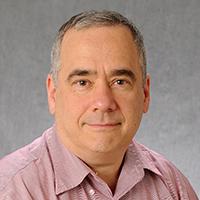David Mendelowitz

David Mendelowitz
Ph.D.
Professor of Anesthesiology and Critical Care Medicine
School: School of Engineering and Applied Science
Department: Pharmacology and Physiology
Contact:
David Mendelowitz's research career is focused on the autonomic nervous system control of cardiorespiratory function with the goal of identifying new targets to reduce and/or prevent highly prevalent and devastating diseases, including obstructive sleep apnea (OSA), arrhythmias, hypertension, cardiac ischemia and heart failure. In 1996 he was the first investigator to study the voltage and ligand gated receptors, firing properties and function of cardiac vagal neurons that generate parasympathetic activity to the heart. His more recent work seeks to identify the alterations in diseases that maintain and/or generate dysfunction of parasympathetic cardiac activity and test if targeted manipulation of the receptors and neurotransmitters to these neurons can restore autonomic balance and improve treatment. Another major interest is the control of hypoglossal motor neurons in the brainstem that control tongue muscles and airway patency, particularly with risk factors for OSA. To test our hypotheses in conscious unrestrained animals we use approaches that include plethysmography, small animals echo, telemetry recordings of blood pressure, heart rate and heart rate variability while selectively altering the activity of specific neuronal targets using chemogenetic Designer Receptors Exclusively Activated by Designer Drugs (DREADDs) that elicit long duration changes in the activity of targeted neurons. To test our hypotheses in-vitro we use optogenetic approaches, as promoter driven expression of channelrhodopsin (ChR2) permits selective photoexcitation of specific neurons and/or pathways while quantifying, using patch clamp electrophysiology, post-synaptic responses in targets such as cardiac vagal or hypoglossal neurons. He has published over 130 peer-reviewed publications, have been continuously funded by NIH as a PI since 1993, and served on multiple NIH study sections, which has enabled me to be widely viewed as an expert in this field. He also takes pride in my record of accomplishment of mentoring young investigators by their continuing success in research.

